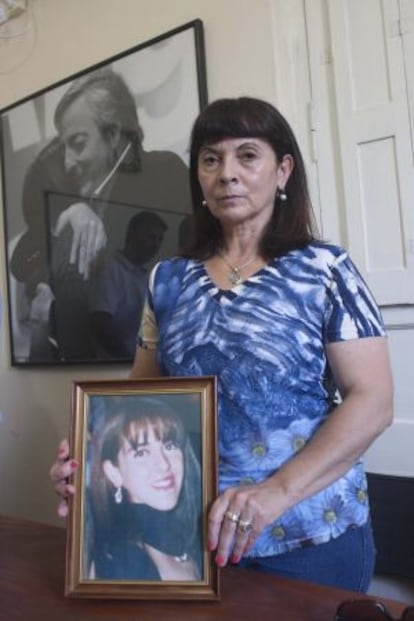Argentina’s bravest mom
Susana Trimarco has been searching for her daughter since 2002 Marita, who was then 23, was abducted and forced into the sex trade


The life of an Argentinean woman named Susana Trimarco took a dramatic turn in 2002, when a human-trafficking ring abducted her daughter Marita Verón, then 23, and forced her into prostitution.
Feeling powerless after the courts and the police refused to investigate the case, the courageous Trimarco, 47, did not hesitate to disguise herself as a prostitute to gain access to the brothels, where she hoped to find clues as to her daughter’s whereabouts.
Her dangerous adventure lasted all of a decade, until she finally managed to haul Marita’s pimp and 12 alleged collaborators before a judge.
A year ago, a provincial court in Tucumán acquitted them all. But Susana Trimarco promised herself that she would not shed a single tear. A year later, the Supreme Court of Tucumán reviewed the case, and convicted 10 out of the 13 suspects.
Argentina’s most courageous mom has won the legal battle, but her victory is not complete. Marita’s whereabouts are still unknown.
“The 2012 decision was shameful, because there was enough evidence there for a conviction; some victims of the sex-trafficking rings were brave enough to step up and say where they had seen my daughter,” explains Susana Trimarco in a telephone conversation with EL PAÍS. “With the intervention by the Supreme Court, an important step has been taken. Now I hope that these criminals will be arrested, because there is a flight risk.”
The higher court has established that three lower-ranking judges must be the ones to establish the penalties for the 10 guilty parties. Trimarco’s lawyers are asking for sentences ranging between 20 and 25 years. “They are accomplices to the trafficking. They kidnap women, tear them from their families, sell them and exploit them,” she says. “I harbor the hope that they will say something about my daughter. But the justice system is not looking for her. I am looking for her. I went to Spain on a lead that suggested she had been sold there, but the attorney in Burgos had neither her photograph nor her fingerprints.”
“They tear them from their families, sell them and exploit them”
It was back in 2007 that she turned her sights on Spain. She knocked on the door of the Spanish embassy in Buenos Aires and even got José Luis Rodríguez Zapatero, then the Spanish prime minister, to issue an invitation to come to Madrid. But nobody in the country was able to provide a single clue about Marita’s whereabouts.
Trimarco has not wavered in her fight, which is similar to that of other mothers who have lost their daughters to the sex trade. “I am looking for my daughter and I continue to rescue girls [from the sex rings],” she says. In the meantime, she has created a foundation to help the victims of sex slavery, and continues to draw attention to the courts’ lack of interest in this issue.
“The justice system is not doing what it has to do. It’s not possible for my daughter to remain missing like this. I want her back, no matter what condition she is in,” she explains.
The 2012 acquittal was used by Argentina’s president, Cristina Fernández de Kirchner, as a reason to push forward a reform “to democratize justice.” But the bill was ultimately declared unconstitutional by the Supreme Court.
I want my daughter back, no matter what condition she is in”
The most recent decision by the Tucumán court did not please Trimarco. First, of course, because her daughter is still missing. “I cannot say that I am happy because I will only be happy when I find my daughter,” she says. But she is also disappointed at the acquittal of the ex-wife and ex-brother-in-law of Rubén Ale, head of the hooligan group of the San Martín soccer club, whom she believes to be chiefly responsible for her daughter’s abduction. Ale did not even stand trial in 2012.
Still, Trimarco is happy that the investigation uncovered a money-laundering scheme that resulted in the arrest of Ale, his ex and three other people. Ale’s former wife, María Jesús Rivero, wrote an angry letter from jail to Trimarco, blaming her for a range of ills, from her own arrest to her mother’s ailing condition as a result of the emotional shock of seeing her daughter behind bars. The letter was sent to the media by Rivero and Ale’s son.
Trimarco’s battle has significantly raised social awareness about the dramatic effects of sex trafficking in Argentina, says one of her lawyers, José D’Antona. Her story, which has spawned a successful television series, led lawmakers to pass legislation to fight sex slavery.
“Last year’s ruling was demoralizing to those who filed the charges,” admits D’Antona. “But it also led to new legal measures against the sex trade and to the closure of brothels. Growing numbers of victims are filing complaints and receiving assistance. These days there is less trafficking in Argentina and more obstacles in its way.”
Tu suscripción se está usando en otro dispositivo
¿Quieres añadir otro usuario a tu suscripción?
Si continúas leyendo en este dispositivo, no se podrá leer en el otro.
FlechaTu suscripción se está usando en otro dispositivo y solo puedes acceder a EL PAÍS desde un dispositivo a la vez.
Si quieres compartir tu cuenta, cambia tu suscripción a la modalidad Premium, así podrás añadir otro usuario. Cada uno accederá con su propia cuenta de email, lo que os permitirá personalizar vuestra experiencia en EL PAÍS.
¿Tienes una suscripción de empresa? Accede aquí para contratar más cuentas.
En el caso de no saber quién está usando tu cuenta, te recomendamos cambiar tu contraseña aquí.
Si decides continuar compartiendo tu cuenta, este mensaje se mostrará en tu dispositivo y en el de la otra persona que está usando tu cuenta de forma indefinida, afectando a tu experiencia de lectura. Puedes consultar aquí los términos y condiciones de la suscripción digital.








































